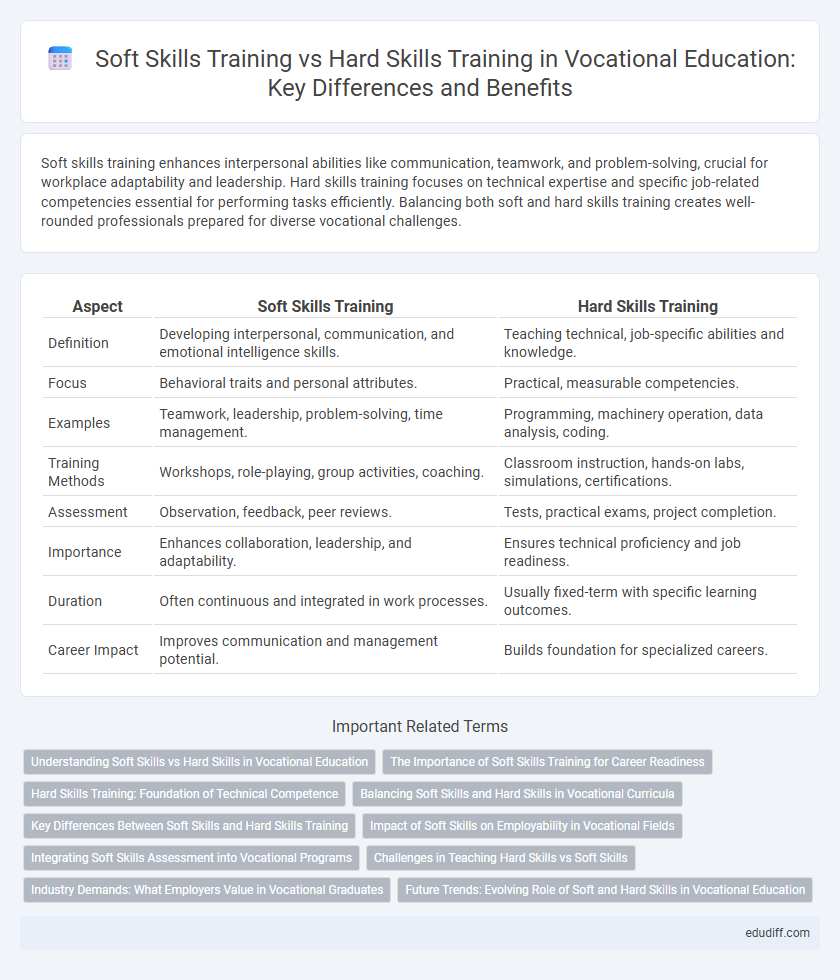Soft skills training enhances interpersonal abilities like communication, teamwork, and problem-solving, crucial for workplace adaptability and leadership. Hard skills training focuses on technical expertise and specific job-related competencies essential for performing tasks efficiently. Balancing both soft and hard skills training creates well-rounded professionals prepared for diverse vocational challenges.
Table of Comparison
| Aspect | Soft Skills Training | Hard Skills Training |
|---|---|---|
| Definition | Developing interpersonal, communication, and emotional intelligence skills. | Teaching technical, job-specific abilities and knowledge. |
| Focus | Behavioral traits and personal attributes. | Practical, measurable competencies. |
| Examples | Teamwork, leadership, problem-solving, time management. | Programming, machinery operation, data analysis, coding. |
| Training Methods | Workshops, role-playing, group activities, coaching. | Classroom instruction, hands-on labs, simulations, certifications. |
| Assessment | Observation, feedback, peer reviews. | Tests, practical exams, project completion. |
| Importance | Enhances collaboration, leadership, and adaptability. | Ensures technical proficiency and job readiness. |
| Duration | Often continuous and integrated in work processes. | Usually fixed-term with specific learning outcomes. |
| Career Impact | Improves communication and management potential. | Builds foundation for specialized careers. |
Understanding Soft Skills vs Hard Skills in Vocational Education
Soft skills in vocational education encompass communication, teamwork, and problem-solving, essential for workplace adaptability and interpersonal relations. Hard skills involve technical expertise and hands-on abilities, such as machinery operation or software proficiency, directly applicable to specific trades. Effective vocational training integrates both skill types to enhance employability and job performance.
The Importance of Soft Skills Training for Career Readiness
Soft skills training enhances communication, teamwork, and problem-solving abilities crucial for career readiness, complementing hard skills that focus on technical expertise. Employers increasingly prioritize soft skills as they drive workplace collaboration and adaptability in dynamic job environments. Investing in soft skills development bridges the gap between vocational knowledge and practical, interpersonal competencies essential for professional success.
Hard Skills Training: Foundation of Technical Competence
Hard skills training develops technical competence by equipping individuals with specific, measurable abilities essential for job performance in fields like engineering, IT, and healthcare. Mastery of hard skills ensures proficiency in operating machinery, coding software, or performing precise medical procedures, which are critical for vocational success. Emphasizing practical, hands-on training accelerates skill acquisition and enhances employability in competitive technical industries.
Balancing Soft Skills and Hard Skills in Vocational Curricula
Balancing soft skills and hard skills in vocational curricula enhances workforce readiness by combining technical expertise with interpersonal abilities such as communication, teamwork, and problem-solving. Effective training programs integrate hands-on technical instruction alongside modules that develop emotional intelligence, adaptability, and critical thinking, preparing students for dynamic work environments. Prioritizing this balance improves employability, job performance, and career advancement within competitive vocational industries.
Key Differences Between Soft Skills and Hard Skills Training
Soft skills training emphasizes communication, teamwork, and emotional intelligence, essential for effective workplace interactions, while hard skills training focuses on technical abilities such as computer programming, machinery operation, or data analysis. Soft skills are inherently interpersonal and adaptable across various job roles, whereas hard skills are specific, measurable competencies required for particular tasks or professions. Vocational programs often integrate both, recognizing that mastery of hard skills paired with strong soft skills enhances overall job performance and career advancement.
Impact of Soft Skills on Employability in Vocational Fields
Soft skills training, including communication, teamwork, and problem-solving, significantly enhances employability in vocational fields by fostering adaptability and interpersonal effectiveness. Employers increasingly prioritize candidates with strong soft skills as these qualities improve workplace collaboration and client interactions. In contrast, hard skills training equips individuals with technical expertise but often requires complementing soft skills to maximize job performance and career advancement opportunities.
Integrating Soft Skills Assessment into Vocational Programs
Integrating soft skills assessment into vocational programs enhances workforce readiness by measuring communication, teamwork, and problem-solving abilities alongside technical competencies. Emphasizing soft skills evaluation ensures graduates possess essential interpersonal capabilities that employers prioritize for career success. This balanced approach improves training outcomes by aligning hard skills mastery with crucial emotional intelligence and adaptability metrics.
Challenges in Teaching Hard Skills vs Soft Skills
Teaching hard skills often faces challenges related to rapidly evolving technology and the need for up-to-date equipment and materials, making curriculum adaptation complex. Soft skills training encounters difficulties in measuring progress objectively and requires personalized approaches to effectively develop communication, teamwork, and problem-solving abilities. Balancing practical, hands-on experiences with interpersonal skill development remains a critical challenge in vocational education.
Industry Demands: What Employers Value in Vocational Graduates
Employers in the vocational sector prioritize soft skills such as communication, teamwork, and problem-solving alongside technical hard skills like machinery operation and software proficiency. Industry demands reveal that graduates combining both skill sets excel in adaptability and productivity, meeting evolving workplace challenges effectively. Emphasizing soft skills training enhances employability and complements hard skills, aligning with employer expectations for versatile vocational professionals.
Future Trends: Evolving Role of Soft and Hard Skills in Vocational Education
Soft skills such as communication, adaptability, and problem-solving are becoming increasingly vital in vocational education as automation and AI reshape job requirements. Hard skills including technical proficiency and industry-specific knowledge remain critical but require continuous updating to align with emerging technologies. Future vocational training programs will integrate both soft and hard skills to prepare learners for dynamic and interdisciplinary career landscapes.
Soft Skills Training vs Hard Skills Training Infographic

 edudiff.com
edudiff.com